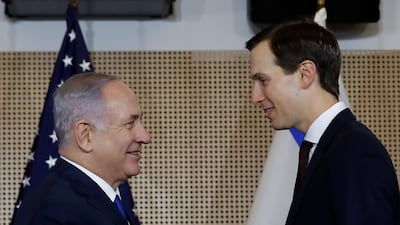Even before today’s bombshell announcement from Israel that its sitting Prime Minister Benjamin Netanyahu will face three criminal indictments, US efforts to relaunch the peace process have been facing an uphill battle in the region.
The US team, led by Donald Trump’s adviser and son-in-law Jared Kushner and envoy Jason Greenblatt, is in the Middle East, finishing a one-week tour that has included the United Arab Emirates, Oman, Bahrain, Saudi Arabia and Turkey.
The delegation is still planning to visit Qatar and Morocco before returning to Washington.
While Mr Kushner’s trip is focused on economic issues and creating a fund with the support of regional governments to boost the Palestinian economy, these efforts are now undermined by the news from Israel.
Just hours before the indictments against Mr Netanyahu were announced, US President Donald Trump lavished him with praise.
“I can say this, he’s done a great job as prime minister…he is smart and strong,” Mr Trump said during his trip to Hanoi.
Mr Netanyahu was slapped with bribery, fraud and breach of trust charges just 40 days before the Israeli elections on April 9.
Mr Trump and Mr Netanyahu had a strong alliance even before the US president took office in January 2017.
The two men see eye-to-eye when it comes to regional challenges including Iran, pressuring the Palestinian Authority and counter terrorism.
Mr Netanyahu has used his bromance with Mr Trump in election billboards across Israel, and the two are expected to meet end of March when Bibi visits Washington to speak at the American Israeli Public Affairs Committee (AIPAC) convention.
A senior US official insists that the administration’s peace plans are not contingent on Mr Netanyahu staying in office, and that the White House remains ready to work with a number of Israeli leaders.
But Mr Netanyahu’s legal troubles could complicate both the timing of the US plan release and its chances of success, Ghaith Al Omari, a senior fellow at the Washington Institute for Near East Policy, told The National.
“The peace plan was widely expected to be released immediately after the upcoming Israeli elections (April 9) but with the potential indictment and the emergence of serious political challengers in the Israeli election, create uncertainties that may impact the timing of the plan’s release.”
Even before Thursday’s news, the US peace team had encountered challenges in pitching the plan to Arab allies.
“Jared Kushner’s regional tour, which was intended to garner regional support for the economic aspects of the forthcoming US peace plan, predictably failed to produce concrete results,” Mr Al Omari argued.
His reasoning is that the trip only “highlighted the inherent tension” with the US unwilling “to share information about the political aspect of the plan”.
“The tour failed to take account of regional sensitivities, by excluding Jordan and Egypt - the two most important Arab states when it comes to the peace process- from the itinerary,” he said.
Natan Sachs, the director of the Center for Middle East Policy at Brookings, pointed to other flaws in the US efforts.
“What we've seen so has been very heavy on the economics and very light on everything else.
“Focusing on the economics is crucial, but we've seen many times: the promise of a better life has not brought people to compromise on what they see as core national interests or values,” Mr Sachs told The National.
“The devil will be in the political details” which have not yet been released.
The continuing US tension with the Palestinian Authority also constrains Mr Kushner’s efforts.
“With everything that's happened between the US and the Palestinians since December 2017, the chance that they accept the plan is very low,” said Mr Sachs.
In that context, “the Arab states will be crucial, but they cannot coerce the Palestinians on key issues such as East Jerusalem,” the expert said.

